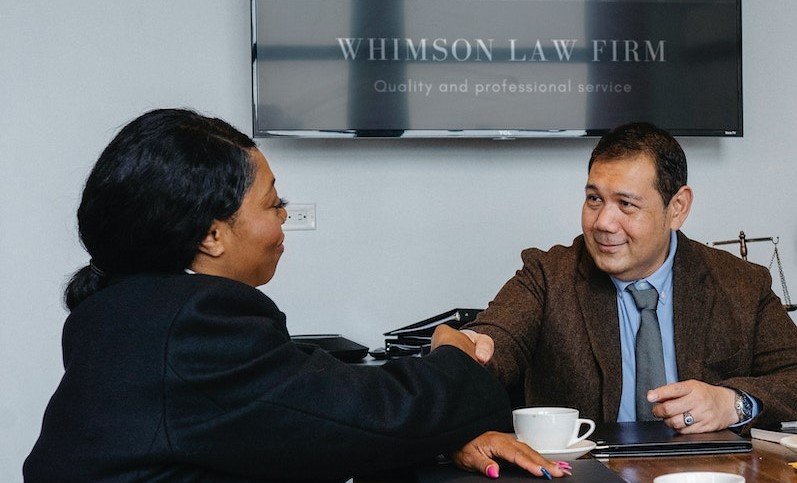10 min read
ALPS In Brief Podcast – Episode 28: Making Healthy Goals into Realities
When our behaviors become destructive and start to negatively impact our health or relationships, we’re motivated to make a change, but change is...
We've crafted solutions tailored to your firm
The world of insurance for law firms can be confusing, and difficult to navigate. We've created this glossary because these common insurance terms should be easy to understand.
3 min read
 Mark Bassingthwaighte, Risk Manager
:
Jan 3, 2018 12:00:00 AM
Mark Bassingthwaighte, Risk Manager
:
Jan 3, 2018 12:00:00 AM

No one enjoys hearing feedback about themselves that is critical in nature; but don’t get me wrong. Sometimes we need to hear that we’re not meeting the expectations of others. Critical feedback shared respectfully can be a wonderful opportunity for personal and professional growth. That said, when a former client posts a review, on something like an attorney rating site, that is full of vitriol and outright lies, well that’s something else entirely. Now the temptation to fight back and defend one’s reputation is in play. The interesting ethical question is this. Can you?
The answer isn’t as simple as you might think. Yes, there is an exception in our confidentiality rule (Rule 1.6) that permits an attorney to reveal information relating to the representation of a client to the extent the attorney reasonably believes necessary to establish a claim or defense in a controversy between the attorney and the client. This is often referred to as the self-defense exception. Unfortunately, every authority who has considered the question has held that an attorney facing this situation cannot disclose confidential information to rebut a former client’s allegations about the attorney’s representation of that person. Why? Because there is no legal controversy. The exception really doesn’t come into play unless and until you are having to deal with the likes of a bar complaint, legal malpractice claim, or fee dispute. A negative online review simply doesn’t get you there.
Although, while you can’t disclose client confidences to defend yourself, there is no ethical prohibition against disagreeing with this client’s publicly voiced criticisms of you in more generic terms. As a risk guy, however, I need to suggest that doing so may not be the best idea depending upon how you end up handling the exchange. Think about how others, some of whom might be potential new clients or even current clients, might respond to the debate you are about to enter into.
For example, don’t take the bait on a fight you won’t win. Participating in name calling, a war of words, or worse can too easily position you as someone who can’t handle a little criticism; and truth be told, the consuming public isn’t interested in trying to figure out who’s right and who’s wrong in their respective opinions. Making matters worse, the very fact that you feel free to fight with a former client on an online forum would suggest to any viewer that they risk being treated similarly were they were ever to voice dissatisfaction with your services.
The better choice is to view the negative review for what it is, a marketing opportunity. Josh King, General Counsel for Avvo, has shared the following advice to lawyers fearful of the fallout of a negative online review and I agree with him wholeheartedly.
Negative commentary can be a golden marketing opportunity. By posting a professional, meaningful response to negative commentary, an attorney sends a powerful message to any readers of that review. Done correctly, such a message communicates responsiveness, attention to feedback and strength of character. The trick is to not get defensive, petty, or feel the need to directly refute what you perceive is wrong with the review. . . . [A] poorly-handled response to a negative review is much worse than no response at all. It makes you look thin-skinned and defensive. Worse yet, if you argue and reveal client confidences (or even potential harmful non-confidences), you may be subject to discipline.[1]
What might such a response look like? While the specifics of the negative review matter, here’s just one idea:
It is unfortunate that the author of this negative review chose not to leave any identifying information, which would have allowed me the opportunity to address his or her specific concerns directly. Understand that as a lawyer, I am ethically prohibited from revealing information relating to my representation of any client in a public forum; however I always welcome the opportunity to discuss the concerns any client, former or current, might have with the service I provide. It is with pride that I share that I have handled over 500 matters of this type during my 21 years of practice and I have yet to have anyone directly express any concerns with the representation they received.
I know that the desire to standup and defend oneself can be strong, particularly when your professional skills and reputation are called into question. Should you ever find yourself staring at a negative review that starts to make your blood boil, just stop and take a few breathes. Remember what Rule 1.6 says, think about what it means to be a professional, and take the high road by drafting a response along the lines of what I’ve suggested. As I see it, there’s no better ethically permissible way to try and shut the criticism down, and why not take advantage of Josh’s “golden marketing opportunity” at the same time!
[1] Josh King, Your Business: Someone Online Hates You, THE RECORDER (Aug. 16, 2013, 4:40 PM) http://www.therecorder.com/id=1202614786352/Your-Business:-Someone-Online-Hates- You?slreturn=20140026162748.
Since 1998, Mark Bassingthwaighte, Esq. has been a Risk Manager with ALPS, an attorney’s professional liability insurance carrier. In his tenure with the company, Mr. Bassingthwaighte has conducted over 1200 law firm risk management assessment visits, presented over 600 continuing legal education seminars throughout the United States, and written extensively on risk management, ethics, and technology. Mr. Bassingthwaighte is a member of the State Bar of Montana as well as the American Bar Association where he currently sits on the ABA Center for Professional Responsibility’s Conference Planning Committee. He received his J.D. from Drake University Law School.

10 min read
When our behaviors become destructive and start to negatively impact our health or relationships, we’re motivated to make a change, but change is...

The two most common excuses I’ve heard over the years for not having a succession plan in place are these. It’s either “my plan is to die at my...

3 min read
Occasionally a lawyer will reach out to me wanting clarification on what should be covered in a letter notifying active clients, whose matters the...